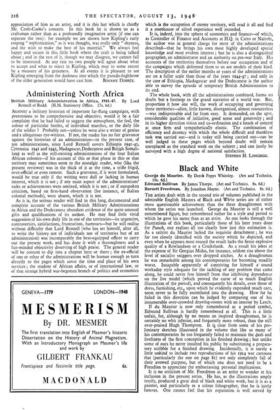Administering North Africa
AGAINST a 'military historian of important far-flung campaigns, with pretensions to be comprehensive and objective, would it be a fair complaint that he had failed to suggest the atmosphere, the feel, the colour of particular battles, of individual marches, or the daily life of the soldier ? Probably not—unless he were also a writer of genius and a ubiquitous eye-witness. If not, the reader has no fair grievance against the historian of an administration—in the present case, of ten administrations, since Lord Rennell covers Ethiopia 1941-42, Cyrenaica 1941 and 1942, Madagascar, Dodecanese and BritiAh Somali- land as well as the still-existing administrations of the four Italian African colonies—if his account of this or that phase in this or that territory may sometimes seem to the nostalgic reader, who (like the Present reviewer) was in the thick of it at the time, a trifle frigid, over-official or even remote. Such a grievance, if it were formulated, would be true only if the writing were dull or lacking in human interest, which it is not ; if any main aspect of the administrations' tasks or achievements were omitted, which it is not ; or if outspoken criticism, based on first-hand observation (for instance, of Italian colonial methods), were absent, which it is not.
As it is, the serious reader will find in this long, documented and complete account of the various British Military Administrations in Africa and the Dodecanese abundant evidence of the quite unusual gifts and qualifications of its author. He may find little vivid suggestion of his own daily life in one of the territories—its urgencies, controversies, satisfactions, frustrations, humours—but he will realise without difficulty that Lord Rennell (who has set himself, after all, to write the history not of individuals nor of territories but of an administration) was incomparably the best-equipped officer to carry out the present work, and has done it with a thoroughness and a fair-minded objectivity deserving of high praise. The general reader will be content to dip into a chapter here or there ; the ex-official of one or other of the administrations will be human enough to turn directly to the pages which cover the time and place of his own services ; the student of African affairs, or of international law, or of that strange hybrid war-begotten branch of politics and economics which is the occupation of enemy territory, will read it all and find it a storehouse of sifted experience well recorded.
It is, indeed, into the sphere of economics and finance—of which, as Controller of Finance and Accounts at H.Q. in Cairo or Nairobi, the author was in general charge for most of the administrations described—that he brings his own most highly developed special knowledge and most evident interest ; but he is also a distinguished geographer, an administrator and an authority on pre-war Italy. His accounts of the territories themselves before our occupation and of the campaigns which delivered them to us are models of their kind. The description of the earlier months or years of the administrations are on a fuller scale than those of the years 1944-47; and only in the case of Ethiopia, Madagascar and the Dodecanese is the author able to survey the episode of temporary British Administration to its end.
The whole book, with all the administrations combined, forms no doubt but a footnote to the grand narrative of a world war. But, proportion it how one will, the work of occupying and governing these territories—alien, little known, disorganised, almost resourceless —was indispensable and far from easy. It demanded, on the spot, considerable qualities of initiative, good sense and generosity ; and in its higher direction vision and co-ordination and a knack of control at once firm and sympathetically elastic The combination of efficiency and decency with which the whole difficult and thankless task was carried out—and is today still being carried out—can be well judged in these pages which beyond doubt will remain unreplaced as the standard work on the subject; and can justly be surveyed with a high degree of national satisfaction.
STEPHEN H. LONGRIGG.


































 Previous page
Previous page